Reflective Journal: Analyzing a Teaching Experience in Mathematics
VerifiedAdded on 2022/11/14
|6
|1294
|53
Journal and Reflective Writing
AI Summary
This reflective journal explores a teaching experience in mathematics, focusing on the author's role as a tutor for children. The author reflects on a specific instance where a student struggled with addition, prompting an evaluation of teaching methods and curriculum design. The journal details the author's initial approach, which prioritized speed and assumed similar learning paces among students. The author then delves into the feelings and evaluation of the experience, acknowledging the need for differentiated instruction and the potential benefits of incorporating games and activities to enhance engagement and understanding. The author references relevant literature on dyscalculia, math anxiety, and the effectiveness of play-based learning. The conclusion emphasizes the importance of adapting teaching strategies to accommodate diverse learning needs and designing interactive activities. The action plan outlines a commitment to incorporating varied instructional designs, simplifying the curriculum, and integrating hands-on activities to foster comprehensive student development.
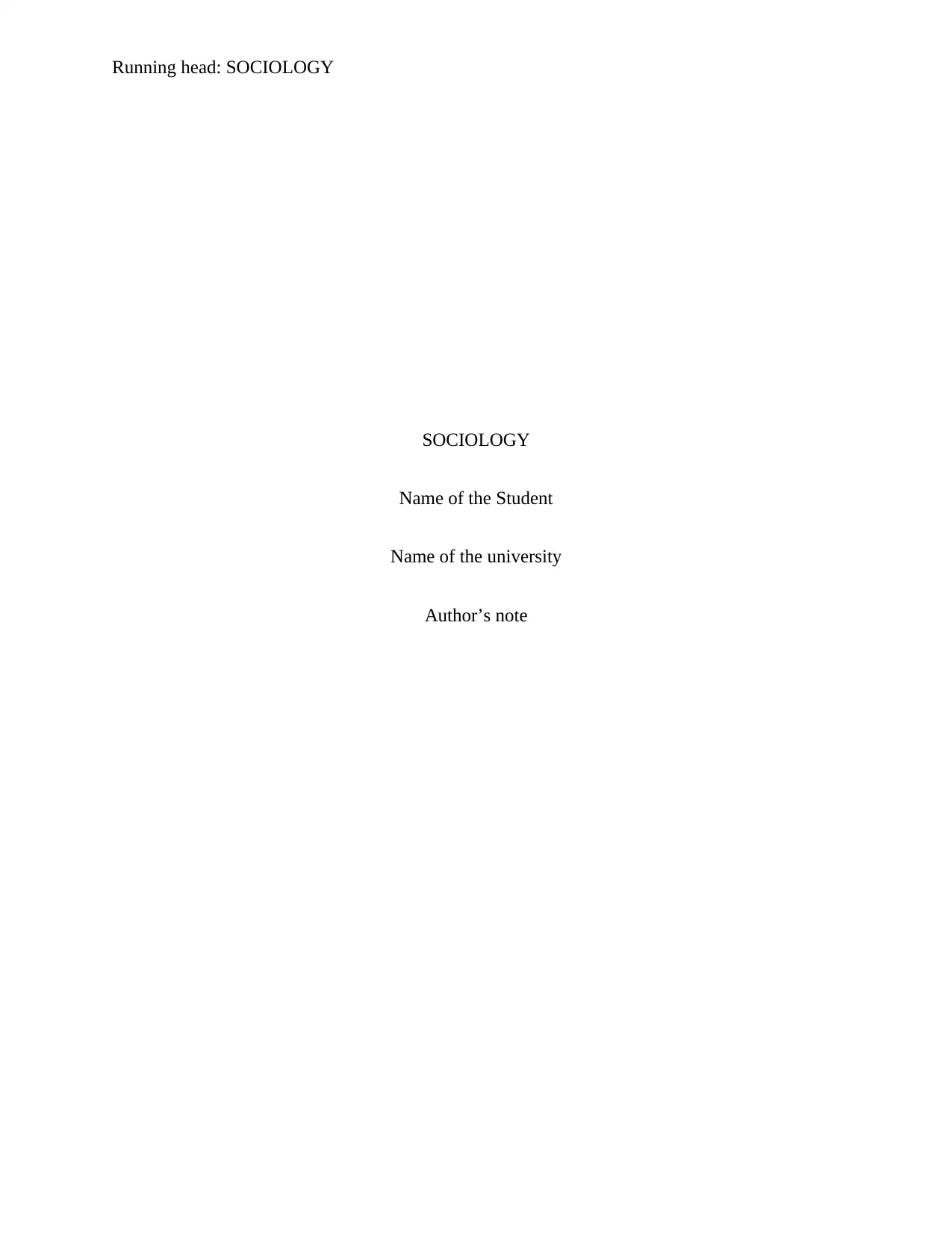
Running head: SOCIOLOGY
SOCIOLOGY
Name of the Student
Name of the university
Author’s note
SOCIOLOGY
Name of the Student
Name of the university
Author’s note
Paraphrase This Document
Need a fresh take? Get an instant paraphrase of this document with our AI Paraphraser
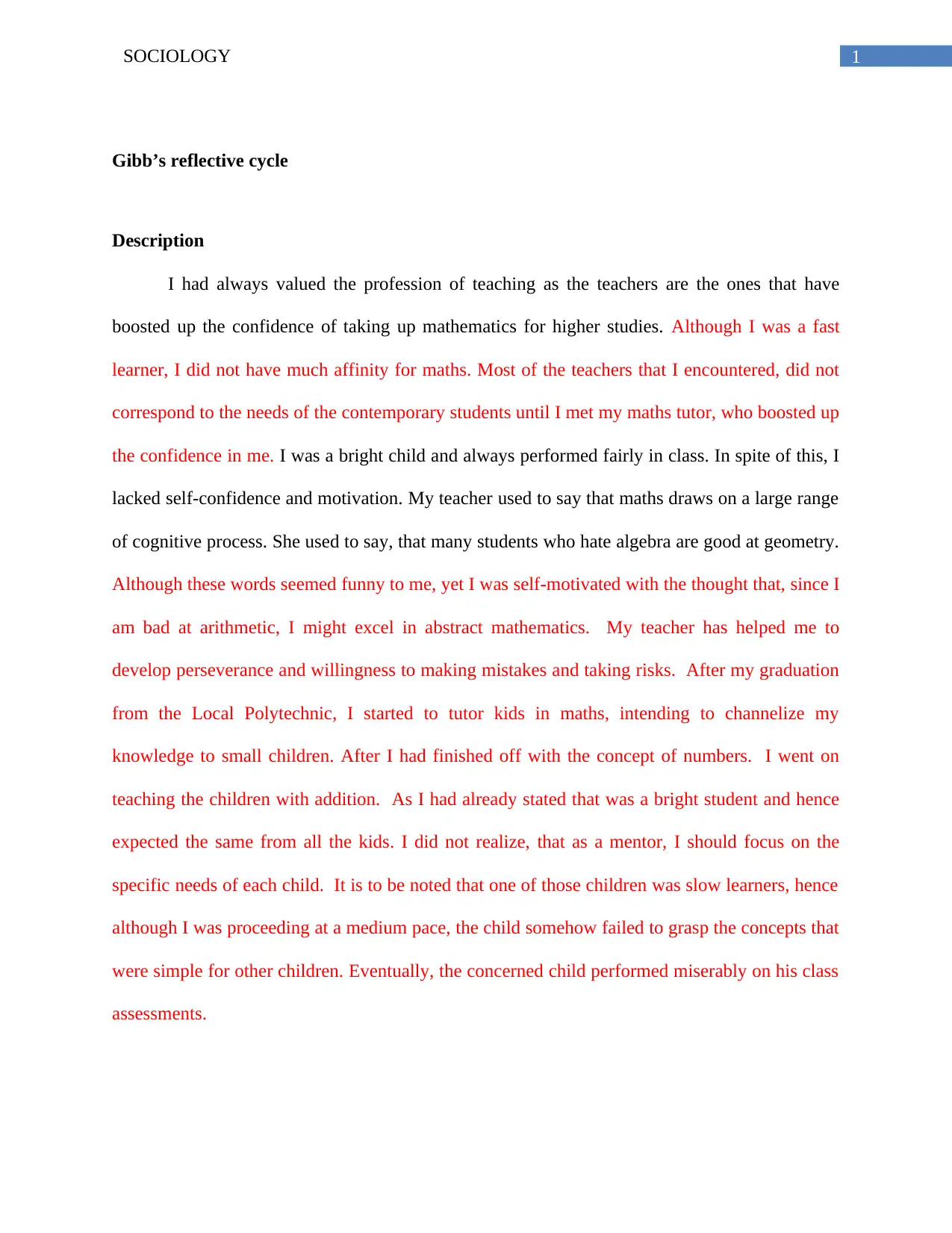
1SOCIOLOGY
Gibb’s reflective cycle
Description
I had always valued the profession of teaching as the teachers are the ones that have
boosted up the confidence of taking up mathematics for higher studies. Although I was a fast
learner, I did not have much affinity for maths. Most of the teachers that I encountered, did not
correspond to the needs of the contemporary students until I met my maths tutor, who boosted up
the confidence in me. I was a bright child and always performed fairly in class. In spite of this, I
lacked self-confidence and motivation. My teacher used to say that maths draws on a large range
of cognitive process. She used to say, that many students who hate algebra are good at geometry.
Although these words seemed funny to me, yet I was self-motivated with the thought that, since I
am bad at arithmetic, I might excel in abstract mathematics. My teacher has helped me to
develop perseverance and willingness to making mistakes and taking risks. After my graduation
from the Local Polytechnic, I started to tutor kids in maths, intending to channelize my
knowledge to small children. After I had finished off with the concept of numbers. I went on
teaching the children with addition. As I had already stated that was a bright student and hence
expected the same from all the kids. I did not realize, that as a mentor, I should focus on the
specific needs of each child. It is to be noted that one of those children was slow learners, hence
although I was proceeding at a medium pace, the child somehow failed to grasp the concepts that
were simple for other children. Eventually, the concerned child performed miserably on his class
assessments.
Gibb’s reflective cycle
Description
I had always valued the profession of teaching as the teachers are the ones that have
boosted up the confidence of taking up mathematics for higher studies. Although I was a fast
learner, I did not have much affinity for maths. Most of the teachers that I encountered, did not
correspond to the needs of the contemporary students until I met my maths tutor, who boosted up
the confidence in me. I was a bright child and always performed fairly in class. In spite of this, I
lacked self-confidence and motivation. My teacher used to say that maths draws on a large range
of cognitive process. She used to say, that many students who hate algebra are good at geometry.
Although these words seemed funny to me, yet I was self-motivated with the thought that, since I
am bad at arithmetic, I might excel in abstract mathematics. My teacher has helped me to
develop perseverance and willingness to making mistakes and taking risks. After my graduation
from the Local Polytechnic, I started to tutor kids in maths, intending to channelize my
knowledge to small children. After I had finished off with the concept of numbers. I went on
teaching the children with addition. As I had already stated that was a bright student and hence
expected the same from all the kids. I did not realize, that as a mentor, I should focus on the
specific needs of each child. It is to be noted that one of those children was slow learners, hence
although I was proceeding at a medium pace, the child somehow failed to grasp the concepts that
were simple for other children. Eventually, the concerned child performed miserably on his class
assessments.
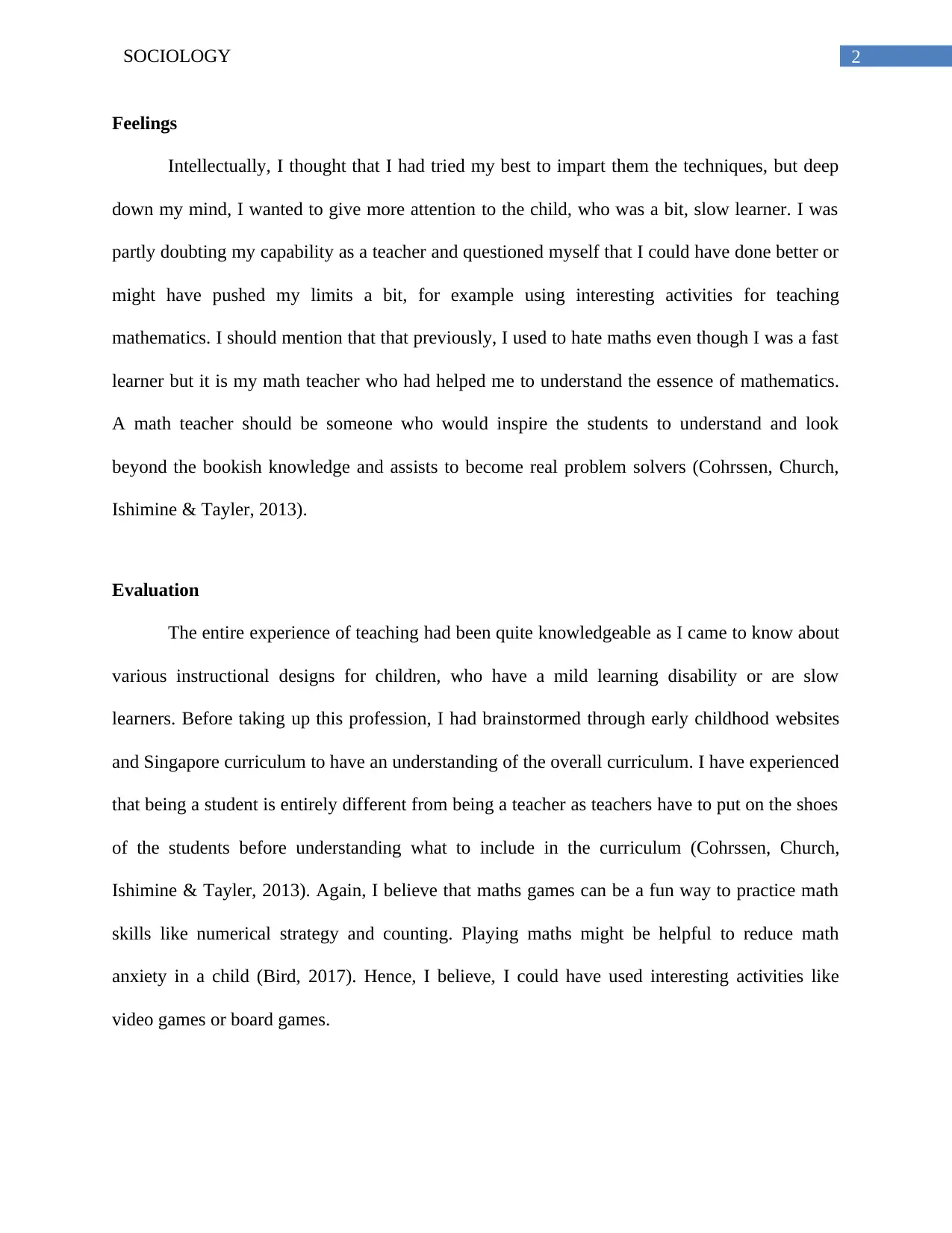
2SOCIOLOGY
Feelings
Intellectually, I thought that I had tried my best to impart them the techniques, but deep
down my mind, I wanted to give more attention to the child, who was a bit, slow learner. I was
partly doubting my capability as a teacher and questioned myself that I could have done better or
might have pushed my limits a bit, for example using interesting activities for teaching
mathematics. I should mention that that previously, I used to hate maths even though I was a fast
learner but it is my math teacher who had helped me to understand the essence of mathematics.
A math teacher should be someone who would inspire the students to understand and look
beyond the bookish knowledge and assists to become real problem solvers (Cohrssen, Church,
Ishimine & Tayler, 2013).
Evaluation
The entire experience of teaching had been quite knowledgeable as I came to know about
various instructional designs for children, who have a mild learning disability or are slow
learners. Before taking up this profession, I had brainstormed through early childhood websites
and Singapore curriculum to have an understanding of the overall curriculum. I have experienced
that being a student is entirely different from being a teacher as teachers have to put on the shoes
of the students before understanding what to include in the curriculum (Cohrssen, Church,
Ishimine & Tayler, 2013). Again, I believe that maths games can be a fun way to practice math
skills like numerical strategy and counting. Playing maths might be helpful to reduce math
anxiety in a child (Bird, 2017). Hence, I believe, I could have used interesting activities like
video games or board games.
Feelings
Intellectually, I thought that I had tried my best to impart them the techniques, but deep
down my mind, I wanted to give more attention to the child, who was a bit, slow learner. I was
partly doubting my capability as a teacher and questioned myself that I could have done better or
might have pushed my limits a bit, for example using interesting activities for teaching
mathematics. I should mention that that previously, I used to hate maths even though I was a fast
learner but it is my math teacher who had helped me to understand the essence of mathematics.
A math teacher should be someone who would inspire the students to understand and look
beyond the bookish knowledge and assists to become real problem solvers (Cohrssen, Church,
Ishimine & Tayler, 2013).
Evaluation
The entire experience of teaching had been quite knowledgeable as I came to know about
various instructional designs for children, who have a mild learning disability or are slow
learners. Before taking up this profession, I had brainstormed through early childhood websites
and Singapore curriculum to have an understanding of the overall curriculum. I have experienced
that being a student is entirely different from being a teacher as teachers have to put on the shoes
of the students before understanding what to include in the curriculum (Cohrssen, Church,
Ishimine & Tayler, 2013). Again, I believe that maths games can be a fun way to practice math
skills like numerical strategy and counting. Playing maths might be helpful to reduce math
anxiety in a child (Bird, 2017). Hence, I believe, I could have used interesting activities like
video games or board games.
⊘ This is a preview!⊘
Do you want full access?
Subscribe today to unlock all pages.

Trusted by 1+ million students worldwide
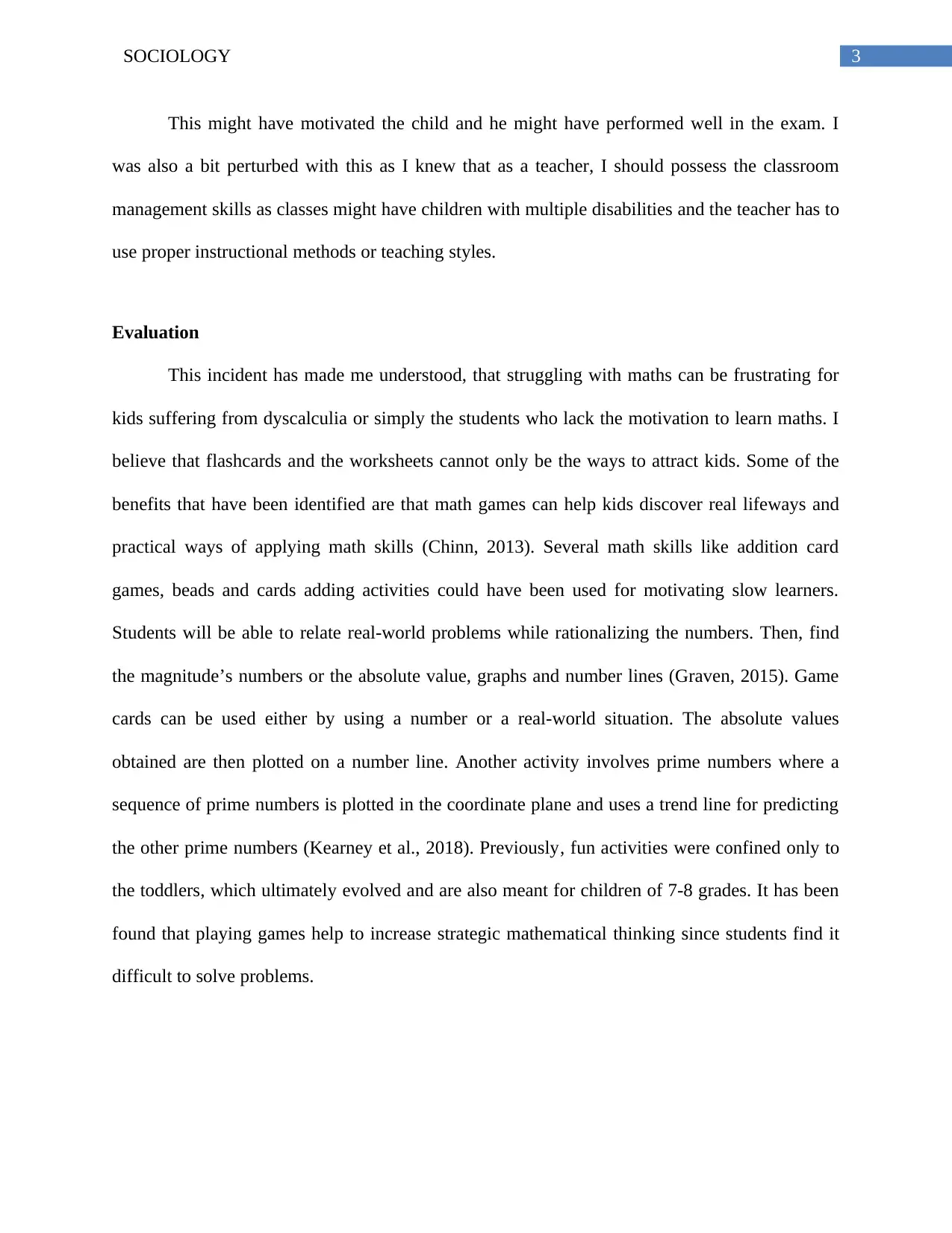
3SOCIOLOGY
This might have motivated the child and he might have performed well in the exam. I
was also a bit perturbed with this as I knew that as a teacher, I should possess the classroom
management skills as classes might have children with multiple disabilities and the teacher has to
use proper instructional methods or teaching styles.
Evaluation
This incident has made me understood, that struggling with maths can be frustrating for
kids suffering from dyscalculia or simply the students who lack the motivation to learn maths. I
believe that flashcards and the worksheets cannot only be the ways to attract kids. Some of the
benefits that have been identified are that math games can help kids discover real lifeways and
practical ways of applying math skills (Chinn, 2013). Several math skills like addition card
games, beads and cards adding activities could have been used for motivating slow learners.
Students will be able to relate real-world problems while rationalizing the numbers. Then, find
the magnitude’s numbers or the absolute value, graphs and number lines (Graven, 2015). Game
cards can be used either by using a number or a real-world situation. The absolute values
obtained are then plotted on a number line. Another activity involves prime numbers where a
sequence of prime numbers is plotted in the coordinate plane and uses a trend line for predicting
the other prime numbers (Kearney et al., 2018). Previously, fun activities were confined only to
the toddlers, which ultimately evolved and are also meant for children of 7-8 grades. It has been
found that playing games help to increase strategic mathematical thinking since students find it
difficult to solve problems.
This might have motivated the child and he might have performed well in the exam. I
was also a bit perturbed with this as I knew that as a teacher, I should possess the classroom
management skills as classes might have children with multiple disabilities and the teacher has to
use proper instructional methods or teaching styles.
Evaluation
This incident has made me understood, that struggling with maths can be frustrating for
kids suffering from dyscalculia or simply the students who lack the motivation to learn maths. I
believe that flashcards and the worksheets cannot only be the ways to attract kids. Some of the
benefits that have been identified are that math games can help kids discover real lifeways and
practical ways of applying math skills (Chinn, 2013). Several math skills like addition card
games, beads and cards adding activities could have been used for motivating slow learners.
Students will be able to relate real-world problems while rationalizing the numbers. Then, find
the magnitude’s numbers or the absolute value, graphs and number lines (Graven, 2015). Game
cards can be used either by using a number or a real-world situation. The absolute values
obtained are then plotted on a number line. Another activity involves prime numbers where a
sequence of prime numbers is plotted in the coordinate plane and uses a trend line for predicting
the other prime numbers (Kearney et al., 2018). Previously, fun activities were confined only to
the toddlers, which ultimately evolved and are also meant for children of 7-8 grades. It has been
found that playing games help to increase strategic mathematical thinking since students find it
difficult to solve problems.
Paraphrase This Document
Need a fresh take? Get an instant paraphrase of this document with our AI Paraphraser
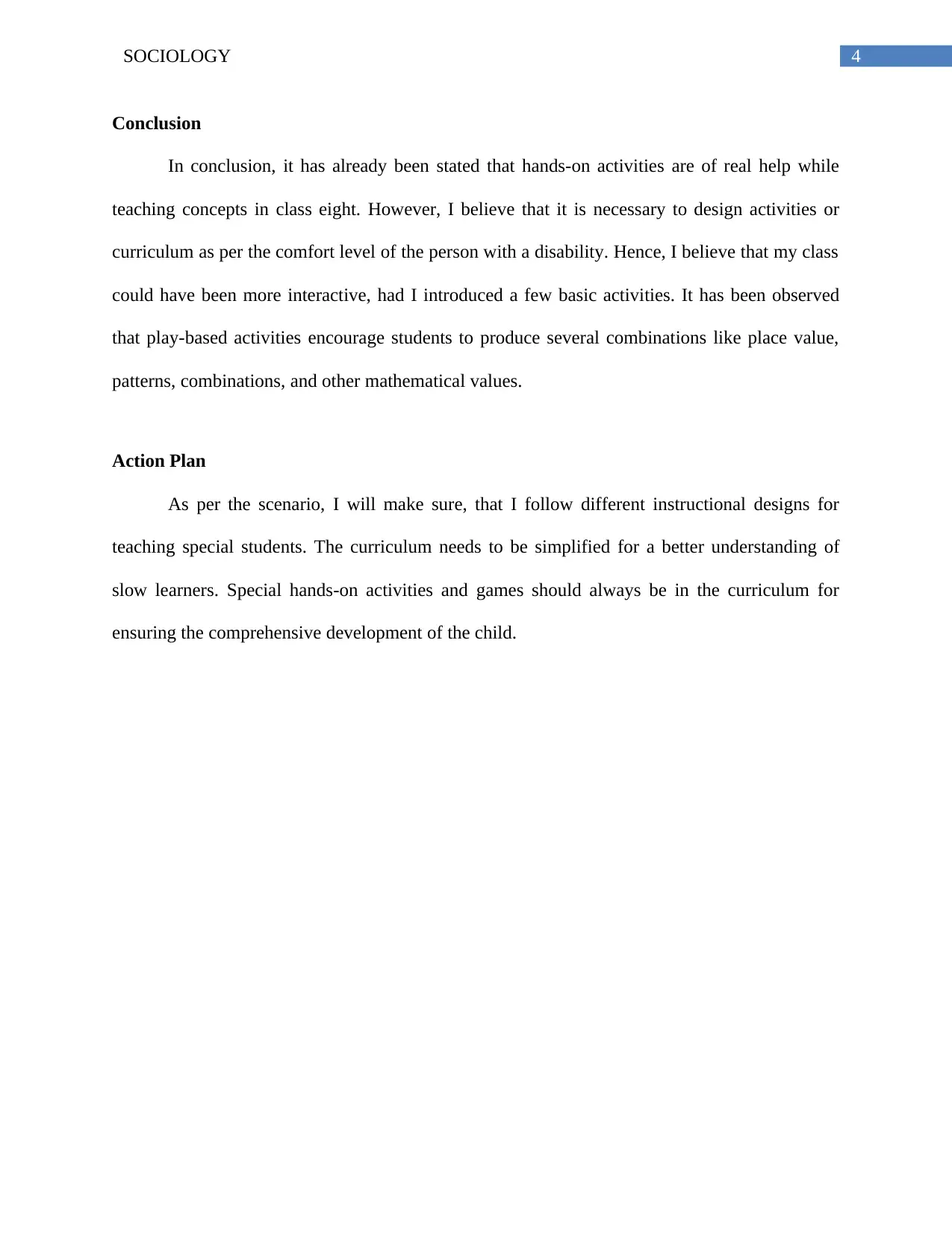
4SOCIOLOGY
Conclusion
In conclusion, it has already been stated that hands-on activities are of real help while
teaching concepts in class eight. However, I believe that it is necessary to design activities or
curriculum as per the comfort level of the person with a disability. Hence, I believe that my class
could have been more interactive, had I introduced a few basic activities. It has been observed
that play-based activities encourage students to produce several combinations like place value,
patterns, combinations, and other mathematical values.
Action Plan
As per the scenario, I will make sure, that I follow different instructional designs for
teaching special students. The curriculum needs to be simplified for a better understanding of
slow learners. Special hands-on activities and games should always be in the curriculum for
ensuring the comprehensive development of the child.
Conclusion
In conclusion, it has already been stated that hands-on activities are of real help while
teaching concepts in class eight. However, I believe that it is necessary to design activities or
curriculum as per the comfort level of the person with a disability. Hence, I believe that my class
could have been more interactive, had I introduced a few basic activities. It has been observed
that play-based activities encourage students to produce several combinations like place value,
patterns, combinations, and other mathematical values.
Action Plan
As per the scenario, I will make sure, that I follow different instructional designs for
teaching special students. The curriculum needs to be simplified for a better understanding of
slow learners. Special hands-on activities and games should always be in the curriculum for
ensuring the comprehensive development of the child.
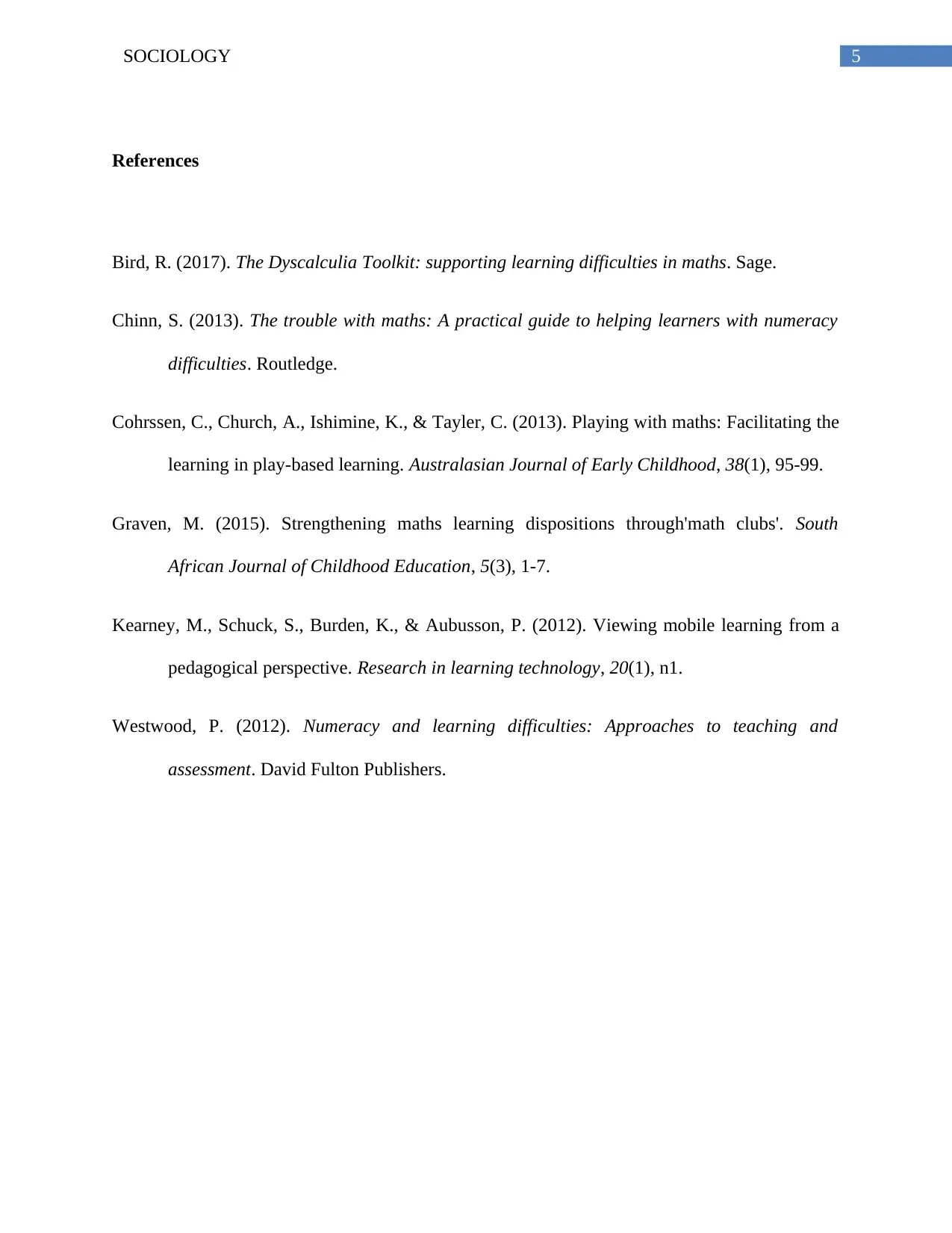
5SOCIOLOGY
References
Bird, R. (2017). The Dyscalculia Toolkit: supporting learning difficulties in maths. Sage.
Chinn, S. (2013). The trouble with maths: A practical guide to helping learners with numeracy
difficulties. Routledge.
Cohrssen, C., Church, A., Ishimine, K., & Tayler, C. (2013). Playing with maths: Facilitating the
learning in play-based learning. Australasian Journal of Early Childhood, 38(1), 95-99.
Graven, M. (2015). Strengthening maths learning dispositions through'math clubs'. South
African Journal of Childhood Education, 5(3), 1-7.
Kearney, M., Schuck, S., Burden, K., & Aubusson, P. (2012). Viewing mobile learning from a
pedagogical perspective. Research in learning technology, 20(1), n1.
Westwood, P. (2012). Numeracy and learning difficulties: Approaches to teaching and
assessment. David Fulton Publishers.
References
Bird, R. (2017). The Dyscalculia Toolkit: supporting learning difficulties in maths. Sage.
Chinn, S. (2013). The trouble with maths: A practical guide to helping learners with numeracy
difficulties. Routledge.
Cohrssen, C., Church, A., Ishimine, K., & Tayler, C. (2013). Playing with maths: Facilitating the
learning in play-based learning. Australasian Journal of Early Childhood, 38(1), 95-99.
Graven, M. (2015). Strengthening maths learning dispositions through'math clubs'. South
African Journal of Childhood Education, 5(3), 1-7.
Kearney, M., Schuck, S., Burden, K., & Aubusson, P. (2012). Viewing mobile learning from a
pedagogical perspective. Research in learning technology, 20(1), n1.
Westwood, P. (2012). Numeracy and learning difficulties: Approaches to teaching and
assessment. David Fulton Publishers.
⊘ This is a preview!⊘
Do you want full access?
Subscribe today to unlock all pages.

Trusted by 1+ million students worldwide
1 out of 6
Related Documents
Your All-in-One AI-Powered Toolkit for Academic Success.
+13062052269
info@desklib.com
Available 24*7 on WhatsApp / Email
![[object Object]](/_next/static/media/star-bottom.7253800d.svg)
Unlock your academic potential
Copyright © 2020–2026 A2Z Services. All Rights Reserved. Developed and managed by ZUCOL.





